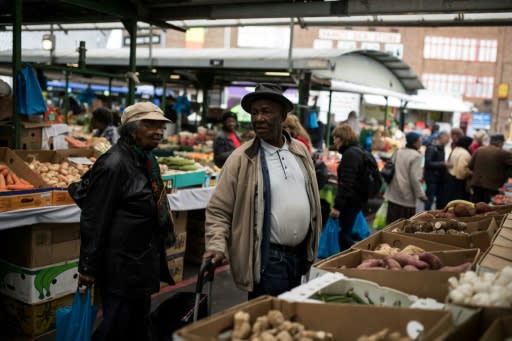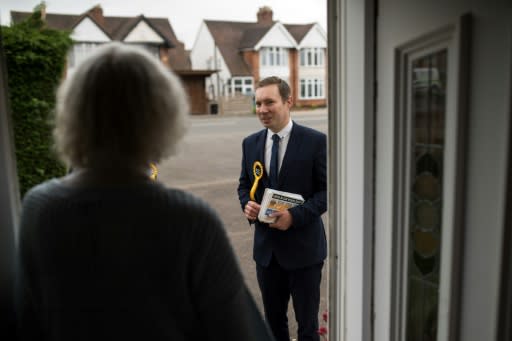'Change is coming': Shifting loyalties behind UK vote
"I've never, ever known it like this," said Brexit Party supporter Peter Stokes-Chapman following a febrile rally in the Midlands, where shifting loyalties point to a looming electoral disaster for Britain's two main parties. "I've never been so passionate about politics, I've been sucked up by it," fellow Brexit supporter Dave, a 47-year-old floor-layer, added before the rally in Willenhall, a few miles north of Birmingham. The area voted strongly to leave the EU, and Brexit Party leader Nigel Farage had few problems in whipping up the 1,000-strong crowd ahead of Thursday's European Parliament elections, in which he is expected to score a crushing victory. Meanwhile the anti-Brexit Liberal Democrats also made major gains in the area in local council elections earlier this month. The common theme? A massive Brexit-fuelled rejection of the Conservatives and Labour, the two parties which have dominated British politics for over a century. "I've voted Tory before, I wouldn't vote for either of the main parties again," Baron Weston, 48, said outside the rally. Former Labour voter Jamindar Hayre, 54, said that on a scale of one to 10, "if 10 is the most angry, I would be on 20 or 30 or 50. "Everyone is not very happy," he said of Prime Minister Theresa May's handling of Brexit, which was supposed to take place on March 29 and has been delayed twice, with Britain now required to elect MEPs. - Lib Dem revival - Only 20 percent of voters who backed the Conservatives in the 2017 general election intend to do so on Thursday, with 62 percent planning to vote for Farage, according to a YouGov poll published on Friday. "A change is coming," Brexit Party candidate Katharine Harborne warned at the rally, a reference aimed at fans of TV series "Game of Thrones". The hit show was inspired by the War of the Roses -- the fight for the British crown that ended with the death of King Richard III in the 1485 Battle of Bosworth. The same Midlands town, around 20 miles (12 kilometres) east of Birmingham, was the scene of another unexpected power shift earlier this month, albeit of less epic and violent proportions. Despite being a Leave-supporting constituency, Hinckley and Bosworth elected the Liberal Democrats, whose EU election slogan is "Bollocks to Brexit", in local polls. "We are the party with momentum," the party's MEP candidate Michael Mullaney said as he pounded the streets of Hinckley. "People who don't want to see a big victory for the Brexit Party need to coalesce around one party. "Labour's support has also fallen very heavily here. We are seen as the best alternative," he added. Labour looks set to pay for its Brexit ambiguity, with predictions that only 35 percent of their 2017 voters will stick with them on Thursday, while 21 percent are seen switching to the Liberal Democrats, now running second in some polls. Mullaney was interrupted on his rounds by well-wisher Fred, 51, who congratulated him on the recent election win. "I've been Labour but (leader Jeremy) Corbyn's not strong enough," he told AFP. "Farage could have been a temptation at one time, but he doesn't support the National Health Service." - 'Totally let down' - Fred's concerns reveal an unprecedented fluidity in Britain's political landscape. Brexit Party candidate Martin Daubney, former editor of men's magazine Loaded, told AFP that Brexit had "pushed the reset button" on British politics. The view was echoed by voters in central Birmingham's Bullring markets, where some stalls were decorated with Brexit Party placards. "I'm totally confused and let down," said butcher Alan Doherty, 73, in between serving customers. "We've got a successful country and they are fighting and squabbling, and together they are ruining it," he said, adding that he may even vote for Farage in a general election despite voting to Remain in 2016. Colleague Dave said it was "definitely" the end of the two-party system, and "I'm very happy about it." "Abso-definitely-lutely", said florist Anthony Rowe, 52, when asked if he would vote for Farage in a general election, saying Labour and the Conservatives were wrong to rely on age-old loyalties. "It's not really how the people think anymore," he said. Shoppers and traders at Birmingham's Bullring market said they felt let down by the two main parties Brexit Party leader Nigel Farage is expected to score a crushing victory in Thursday's European Parliament elections 'People who don't want to see a big victory for the Brexit Party need to coalesce around one party,' says East Midlands Liberal Democrat candidate Michael Mullaney (shown canvassing in the central town of Hinckley) Liberal Democrat volunteers in the central English town of Hinckley last week





